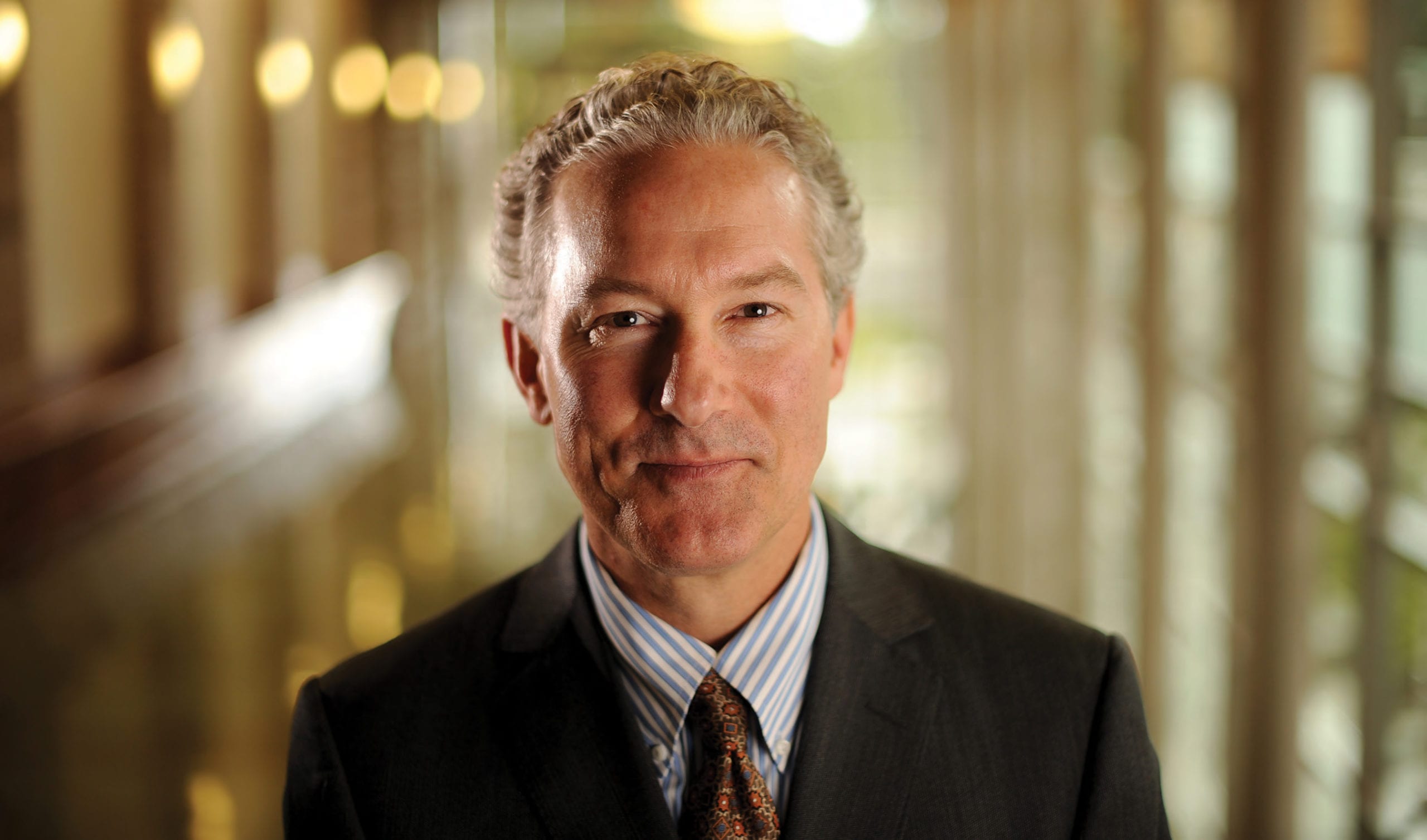Berkeley Haas culture champion Rich Lyons, BS 82, completes his tenure as dean
For Rich Lyons, the summer of 2008 was a watershed moment. He had just taken over as dean of Berkeley Haas and, with each passing day, the news about the U.S. economy worsened. Bad Wall Street bets on home mortgages had already toppled Bear Stearns and were now threatening other venerable banks. Reporters calling Lyons for analysis started asking increasingly pointed questions: with so many MBAs populating the finance industry, were business schools partly to blame for the crisis?
The suggestion was both troubling and galvanizing. Lyons had become the 14th dean of Haas with ambitious plans to position the school as a dominant player in 21st century business education. Long before the economy stumbled, he concluded that businesses had a vital role to play in addressing the world’s biggest challenges. Students were newly hungry for a sense of purpose, and Lyons believed business schools had both the responsibility and opportunity to instill in students a set of core values and greater meaning. The first step was to create a new kind of business school culture.
“I knew that if we could articulate our long-standing values as a school, we could differentiate ourselves and, at the same time, convey to the world in a meaningful way that we understood our responsibilities,” recalls Lyons, who convened a teach-in shortly after Lehman Brothers collapsed in mid-September so finance and banking faculty could explain the roots of the market tailspin.
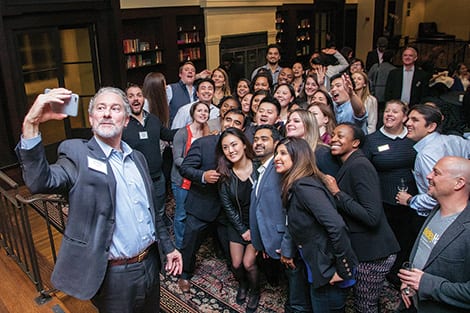
Those hectic first months marked the beginning of one of the most transformative periods in Haas’ 120-year history. Today, as Lyons prepares to step down in June after 11 years at the helm, evidence of his impact is everywhere—most visibly in the school values, or “Defining Leadership Principles,” that Lyons helped codify and are now literally set in stone in the renovated Robert G. O’Donnell Courtyard. The outdoor space is also adjacent to another Lyons feat: Connie & Kevin Chou Hall, a six-story, $60 million edifice dedicated entirely to student learning and interaction, which opened last fall.
Today, about 2,300 students are enrolled in six degree programs that are among the highest ranked in the world. The full-time MBA Class of 2019, with 284 students, is at record size. The revamped curriculum now emphasizes experiential learning and “soft” leadership skills like creative problem framing. Efforts to promote diversity and gender equity have taken center stage. A newly launched undergraduate degree program with the UC Berkeley College of Engineering aims to develop a new breed of tech leaders with courses in liberal arts, engineering, and business. Just as significant: Lyons boosted fundraising to offset dwindling state funding and helped bring in $350 million in donations, including eight of the nine largest gifts in school history. A pledge of up to $25 million from Connie and Kevin Chou, BS 02, is the largest ever from a UC Berkeley alum under age 40.
“I knew that if we could articulate our long-standing values as a school, we could differentiate ourselves and…convey to the world…that we understood our responsibilities.”
— Rich Lyons
“Rich is leaving a very strong foundation for a successor to build upon,” says Jack Russi, BS 82, chair of the Haas School Board and national managing partner of corporate development at Deloitte LLP. Additionally, the Dean Lyons Faculty Leadership Fund has been created to honor Lyons and to help future Haas deans recruit, retain, and develop a new generation of faculty leaders.
Lyons’ mark extends beyond Haas. “He has become a model [for other Berkeley deans]—just as the Haas School has become a model for the campus,” says UC Berkeley Chancellor Carol T. Christ. “I have been so impressed with and, really, sometimes awed, by Rich’s leadership.” Last year she appointed Lyons co-chair of a campuswide strategic planning process.
The Culture Champion
One of the best pieces of advice Lyons received as dean came early in his tenure. Haas School Board member Margo Alexander, BS 68, retired chair and CEO of UBS Global Asset Management, told him he was the chief purpose officer.
Lyons hadn’t always thought of himself in those terms. He was an economist by training, having earned his bachelor’s from Haas in 1982 and then a PhD from MIT. After a six-year teaching stint at Columbia Business School, he joined Haas in 1993, where he taught international finance across various Haas programs and wrote a book, The Microstructure Approach to Exchange Rates. Students loved Lyons, awarding him their top teaching award six times; in 1998, he received the university’s highest honor, the campuswide teaching award. More than anything, Lyons was known for being approachable and authentic, the sort always game to head to Oakland for live blues music at 11:00 p.m. on a weeknight. “He had real street cred,” says Russi, noting that it served him well years later when he set out to establish Haas as the most distinguished-by-culture/values business school in the world.
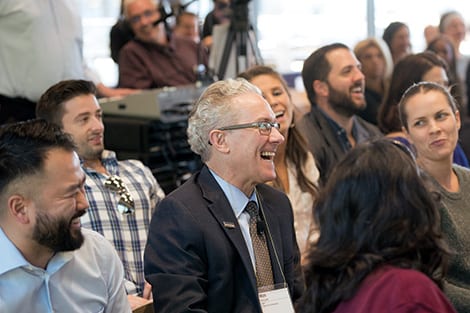
Professor Laura Tyson remembers telling Lyons when she was dean in the late 1990s that he would one day lead Haas. “He’s extremely engaged and energetic,” says Tyson, former chair of the White House Council of Economic Advisers who now directs the Haas Institute for Business & Social Impact. Tyson’s prediction came true in 2004, when Lyons was named interim dean to replace Tom Campbell, who took a one-year sabbatical as the State of California’s director of finance. When Campbell returned to the dean’s suite, Lyons became executive associate dean and then, in 2006, left to serve as chief learning officer at Goldman Sachs. There, he was tasked with developing leadership among the firm’s managing directors and partners. “I learned,” says Lyons of his time at Goldman, “that you can’t overestimate the importance of great people in building great firms.”
When he returned almost two years later as dean, Lyons had one overarching goal: to build on the momentum that his predecessors had created. One of his main priorities was to expand the physical campus with a fourth building exclusively for student learning and networking. He also wanted to launch new programs, hire more faculty, and revamp the curriculum to include more hands-on learning through partner programs with companies.
Developing a new breed of business leader topped his to-do list. The world, Lyons had long believed, was on a dangerous path, harmed by a series of missteps involving the environment, health, safety, education, aging demographics, and other “unsustainabilities of our time.” Business leaders could course correct, but they needed inspiration and skills that would foster innovation. Lyons knew that world-class business educators could give businesses both, but schools needed first to develop a culture—one that eschewed clichés in favor of authentic, distinguishing values. “We don’t succeed by being the same,” Lyons told fellow deans in a 2016 talk at Rutgers Business School. “We succeed by being different in a useful and productive way.”
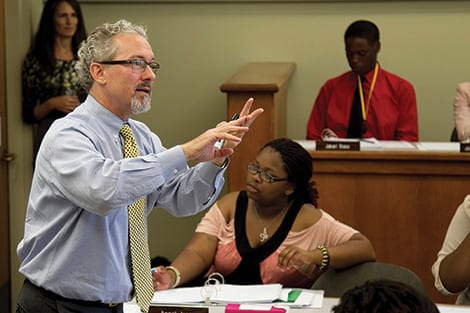
The introduction of the Defining Leadership Principles—Question the Status Quo, Confidence Without Attitude, Students Always, and Beyond Yourself—in 2010 sent a powerful signal. “We drew a line in the sand about the kind of leaders we intended to produce and the kind of impact we intended those leaders to have on the world,” says Jennifer Chatman, PhD 88, Haas’ Paul J. Cortese Distinguished Professor of Management whose research Lyons credits for waking him up to the power of organizational culture.
Today, the Defining Leadership Principles are firmly embedded in the school, operationalized in essay applications, staff performance reviews, and faculty teaching. In surveys, students cite the principles as the number one reason they chose Haas, ahead of its top-tier reputation and prime location near Silicon Valley. Paul Norton, MBA/MPH 18, says students are inculcated with the school’s values from the moment they step on campus. “Dean Lyons [has stressed] that this experience is about much more than taking your classes and finding your dream job,” he says. “It’s about building this community and embodying those characteristics in every aspect of your life.” Donning his chief purpose officer hat, Lyons has been known to send “purpose emails” to faculty and staff reminding them of the school’s mission.
“I don’t think there’s a conversation I’ve had with Rich where the four principles haven’t come up,” says Chancellor Christ, who quoted the Defining Leadership Principles as an example of the kind of values she hopes to articulate for the university as a whole when she was sworn in last December.
Fellow deans call Lyons’ leadership inspirational. Peter Henry, the dean of New York University Stern School of Business until the end of last year, admires how Lyons was able to weave the principles into the fabric of Haas. “The Defining Principles aren’t just a brand, they are a way of life,” says Henry, who has known Lyons for nearly two decades. “Everyone owns them, from top to bottom.” Adds Sally Blount, dean of Northwestern University’s Kellogg School of Management: “The most effective deans pick three or four things that they’re really going to try to move the needle on. [But] it’s one thing to say you’re going to do something and another to do it consistently and with discipline. Rich has done that better than just about any other dean on the planet over the last 10 years.”
A Bright Future
Lyons has succeeded because he embodies the same values he so tirelessly champions. “He’s a servant leader—someone who puts your needs in front of their needs,” says Russi. Lyons, for example, regularly shares with all staff the positive feedback he receives—from students, alumni, or visitors—to illustrate how the work everyone does matters, a practice that has earned him great respect from his employees. Students are also drawn to his supportive and motivating nature. Sal Parsa, who was born and raised in Afghanistan, recalls meeting Lyons on his second day at Haas and instantly recognizing the kind of leader he aspired to be. “[Dean Lyons] is the most humble person I have ever met,” says Parsa, MBA 18.
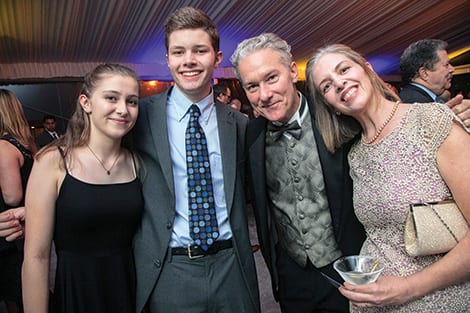
Lyons’ embrace of Question the Status Quo was evidenced, too, by his commitment to diversity in all its forms. This meant not just drawing more applicants with divergent backgrounds and worldviews, but also equipping students with the skills and mindset to lead increasingly diverse workforces. To that end, Lyons created a staff position, director of diversity and inclusion, and oversaw the formation in 2012 of the Alumni Diversity Council, which assists with admissions, curriculum development, and events. In November, the new Center for Gender, Equity & Leadership opened to advance gender and diversity in policy and business, among other goals. New student-led diversity programs, including the research-based Race Inclusion Initiative and the Gender Equity Initiative, are flourishing. Every strategic plan now has a diversity component.
“Rich has been much more than just an ally and a thinker on diversity issues,” says Monica Stevens, MBA 96, a senior vice president at Wells Fargo who founded and leads the 20-person Alumni Diversity Council. “He’s actually shown up.”
Lyons was an unconventional leader for another reason: his acoustic guitar. Nearly every Haas student from the last decade has a story to tell about their earring-wearing, strumming dean and the first time they heard him croon, perhaps at an orientation party or the school’s annual talent show. Last August, Lyons brought the house down with a rousing rendition of The Jungle Book ditty, “The [Bear] Necessities,” during the new-student convocation. When Lyons couldn’t make an 80s-themed party for incoming students, he recorded Tracy Chapman’s “Give Me One Reason” and emailed it to each class member before the dance. “We all fell in love with him in that moment,” recalls Parsa.
Looking back, Lyons calls his time as dean “the most fulfilling job of my career.” He plans to take a sabbatical to write a book before returning to teaching in the fall of 2019. His book, he says, will challenge the public’s rush to judgment when business scandals erupt. “People look at three or four titillating stories about inexcusable behavior by business people and they say, ‘All of business is bad,’” he says, adding that more evidence-based assessments are needed. He’s also been doing some consulting for startups, which has him thinking, too, about opportunities in financial or educational technology.
For now, Lyons is focused on making sure the Defining Leadership Principles endure. He lobbied, for example, for the dean’s job description to include a commitment to advancing the principles. He’s also appointed several faculty and staff members as “culture champions” and co-authored a case study about values. The school board has announced it will audit the next dean’s culture efforts a year into his or her job. Lyons says it’s important the principles be flexible. “Cultures need to evolve over time,” he says, “so elements of how we implement the Defining Leadership Principles should change.”
Haas, too, will inevitably change—for the better, thanks to the legacy of Dean Rich Lyons.
